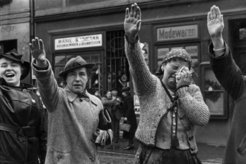Emotional Citizens
Love, Loyalty, and Trust in Politics
Ute Frevert

Modern societies are familiar with the strong emotional connection between citizens and their political representatives. State leaders stand in particularly high regard and receive dozens of letters (and nowadays e-mails) on a daily basis, in which "ordinary" people pour their hearts out. This response is even more pronounced if the political leaders portray themselves as fatherly (and more seldom, motherly) figures who are willing to lend an ear to the worries and needs of their citizens.
This project examines this type of "Gefühlspolitik" (emotional politics) with recourse and in contrast to early modern practices of government and leadership. It questions its function for the stabilization and legitimation of political power, and it traces its developments throughout different constitutions (monarchies/republics, democratic/totalitarian). In concentrating on feelings such as love, loyalty, and trust (and mistrust), the project measures the emotional topography of political communication from the perspective of both those in power, as well as those dealing with this power.
Written sources include letters that citizens wrote to their state officials, as well as official addresses and speeches. The emotional power of symbols and pictures is evident in sources such as monarchic paraphernalia, patriotic songs and poetry, celebrations of officials' birthdays, political party conventions, and posters of democratic candidates. Furthermore, this symbolism attests to the intense reciprocal relationship between above and below.
